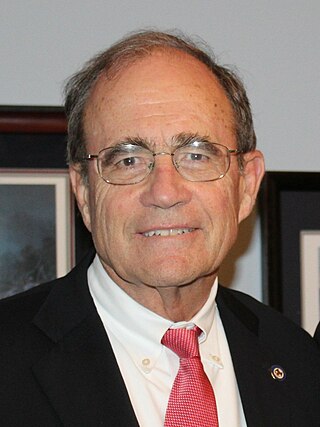
Abram Marshall Scott was a politician in Mississippi. He was born in Edgefield County in the Province of South Carolina. He was an early settler of Wilkinson County, Mississippi and was instrumental in founding the town of Woodville, Mississippi. He held local political offices before his election to the Mississippi State Senate. As President of the Mississippi Senate he also served as Lieutenant Governor of Mississippi. He belonged to the National Republican Party.

John Marshall Stone was an American politician from Mississippi. A Democrat, he served longer as governor of that state than anyone else, from 1876 to 1882 and again from 1890 to 1896. He approved a new constitution in 1890 passed by the Democratic-dominated state legislature that disfranchised most African Americans, excluding them from the political system for more than 75 years.

The Mississippi House of Representatives is the lower house of the Mississippi Legislature, the lawmaking body of the U.S. state of Mississippi. According to the state constitution of 1890, it is to comprise no more than 122 members elected for four-year terms. To qualify as a member of the House candidates must be at least 21 years old, a resident of Mississippi for at least four years, and a resident in the district for at least two years. Elections are held the first Tuesday after the first Monday in November.

The Mississippi State Senate is the upper house of the Mississippi Legislature, the state legislature of the U.S. state of Mississippi. The Senate, along with the lower Mississippi House of Representatives, convenes at the Mississippi State Capitol in Jackson. The Lieutenant Governor of Mississippi serves as President of the Senate.

The Mississippi Legislature is the state legislature of the U.S. state of Mississippi. The bicameral Legislature is composed of the lower Mississippi House of Representatives, with 122 members, and the upper Mississippi State Senate, with 52 members. Both representatives and senators serve four-year terms without term limits. The Legislature convenes at the Mississippi State Capitol in Jackson.

The Mississippi Republican Party is the Mississippi state affiliate of the United States Republican Party. The party chairman is Frank Bordeaux, and the party is based in Jackson, Mississippi. The original Republican Party of Mississippi was founded following the American Civil War, and the current incarnation of the Mississippi Republican Party was founded in 1956. The party would grow in popularity after the 1964 Civil Rights Act and is currently the dominant party in the state.
The Mississippi Plan of 1874–1875 was developed by white Southern Democrats as part of the white insurgency during the Reconstruction era in the Southern United States. It was devised by the Democratic Party in that state to overthrow the Republican Party in Mississippi by means of organized threats of violence and voter suppression against African American citizens and white Republican supporters. Democrats sought to regain political control of the state legislature and governor's office 'peaceably if we can, forcibly if we must.' Their justifications were articulated on a basis of discontent with governor Adelbert Ames' Republican administration, including spurious charges of corruption and high taxes. However, the violence that followed was centred on the desire to return white supremacy to the state. The success of the campaign led to similar plans being adopted by white Democrats in South Carolina and other majority-black states across the South.

The lieutenant governor of Mississippi is the second-highest ranking elected executive officer in the U.S. state of Mississippi, below the governor of Mississippi, and is the only official in the state to be a member of two branches of state government. The office of lieutenant governor was established when Mississippi became a state in 1817, abolished for a few decades in the first half of the 19th century, and restored later in the century. The lieutenant governor serves a four-year term with a two consecutive term limit. The current lieutenant governor is Delbert Hosemann, a Republican, who has held the office since 2020.

The Constitution of the State of Washington is the document that describes the structure and function of the government of the U.S. State of Washington. The constitution was adopted as part of Washington Territory's path to statehood in 1889. An earlier constitution was drafted and ratified in 1878, but it was never officially adopted.

The Mississippi Democratic Party is the affiliate of the Democratic Party in the state of Mississippi. The party headquarters is located in Jackson, Mississippi.

The 1894–95 United States Senate elections were held on various dates in various states. As these U.S. Senate elections were prior to the ratification of the Seventeenth Amendment in 1913, senators were chosen by state legislatures. Senators were elected over a wide range of time throughout 1894 and 1895, and a seat may have been filled months late or remained vacant due to legislative deadlock. In these elections, terms were up for the senators in Class 2.

The Mississippi secretary of state is an officer of Mississippi originally established under the Article IV, §14 of Mississippi Constitution of 1817, and was reestablished under Article V, §133 of the Mississippi Constitution of 1890.

The Government of Mississippi is the government of the U.S. state of Mississippi. Power in Mississippi's government is distributed by the state's Constitution between the executive and legislative branches. The state's current governor is Tate Reeves. The Mississippi Legislature consists of the House of Representatives and Senate. Mississippi is one of only five states that elects its state officials in odd numbered years. Mississippi holds elections for these offices every four years in the years preceding Presidential election years.

The Supreme Court of Mississippi is the highest court in the state of Mississippi. It was established in 1818 per the terms of the first constitution of the state and was known as the High Court of Errors and Appeals from 1832 to 1869. The court is an appellate court. The court consists of nine justices elected in nonpartisan contests from three districts to serve eight-year terms. The most senior justice serves as the chief justice. It is housed in the Carroll Gartin Justice Building in Jackson, Mississippi, the state capital.

Milton Harvey Mabry was an American lawyer, politician, and judge. He served as both the eighth Lieutenant Governor of Florida and chief justice of the Florida Supreme Court.

Sydney McCain Smith was a justice of the Supreme Court of Mississippi from 1909 to 1948, and its chief justice starting in 1912. His 39-year tenure made him "by far the longest-serving Mississippi Supreme Court justice".

The 2019 Mississippi gubernatorial election took place on November 5, 2019, to choose the next governor of Mississippi. Incumbent Governor Phil Bryant was ineligible to run for a third term due to term limits. The Democratic Party nominated incumbent Attorney General Jim Hood, the only Democrat holding statewide office in Mississippi; the Republican Party nominated incumbent Lieutenant Governor Tate Reeves. In the general election, Reeves defeated Hood by a margin of 5.08%, with Reeves significantly underperforming Donald Trump, who won the state by 17 points in 2016.

The 1999 Mississippi gubernatorial election took place on November 2, 1999 to elect the Governor of Mississippi. Incumbent Governor Kirk Fordice, a member of the Republican Party who had been first elected in 1991, was ineligible to run for reelection due to term limits.

United States gubernatorial elections were held in 1889, in eleven states.

















